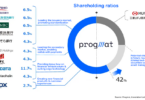Yesterday blockchain real estate startup Coadjute said that New York-based Collab+Currency, a spin off of the Silicon Valley Collaborative Fund, is joining the funding round announced two weeks ago.
“Real estate is an example of an industry where the legacy technical infrastructure relies on data silos that lack interoperability,” said Stephen McKeon, Partner at Collab+Currency. “Enabling the existing players to share the state of the transaction, while maintaining control of their data, is a powerful proposition.” Those players include estate agents, lawyers, mortgage brokers as well as the buyer and seller.
Founder and COO John Reynolds highlighted to Ledger Insights how rare it is for mainstream VCs to back enterprise blockchain firms. He pointed out that the majority of funding has been corporates investing in consortia. But even for non-consortia startups in the enterprise blockchain space, the biggest slice of finance has still come from corporate venture capital. There have been a few exceptions, such as Chronicled, the company behind MediLedger that raised $16 million from Silicon Valley firms more than two years ago.
There’s a good reason for Valley VC funding being a rare event. Many non-consortia enterprise startups still rely on consortia style adoption, which can be slow and unpredictable. And as you’ll see, that’s not the case for Coadjute. Hence, Reynolds believes that Coadjute’s more typical SaaS business model is a reason for it being one of the exceptions. “That’s allowed a traditional venture fund to look at us and go ‘Okay, we recognize this.'”
It also helps that Coadjute ran a high profile pilot last year with more than 40 firms as well as Natwest Bank.
Before exploring the business, it’s worth revisiting the problem Coadjute plans to solve.
The need: time is money
In the UK, it’s common for property transactions to fall through at reasonably advanced stages. There’s even the slang term ‘gazumping’ for outbidding a buyer. Or the buyer might get cold feet or experience a delay in selling their existing home.
Knowing there’s a good chance of failure, the lack of transparency about the status of paperwork and transaction progress is enormously stressful for both the buyer and the seller. And in the UK, that typically drags on for four months.
But the estate agents are often only slightly less in the dark and have to continually phone around to make sure the sale is moving forward. Given they have to do that for every transaction, estate agents must be the party that will benefit most from Coadjute. If a transaction is going to fail, the sooner they know, the sooner they can restart the selling process.
Reducing friction in more ways than one
While the Coadjute solution is all about reducing friction in real estate transactions, a key feature of Coadjute’s rollout is also about minimizing friction. Reynolds was an entrepreneur in residence at enterprise blockchain firm R3 for a couple of years. So he had a ringside seat for the painfully slow process involved with large companies launching blockchain consortia. In many ways, Coadjute’s rollout plan is the polar opposite, aiming to gain market penetration as quickly as possible.
CEO Dan Salmons talking about innovations in general, emphasized the importance of making adoption simple. “It’d be a long journey if you were signing up 20,000 estate agents in the UK individually,” he said. Instead, Coadjute has partnered with software platforms that provide CRM systems for the real estate agents (50% of them so far) and the conveyancing/legal software (30% signed up) that targets the real estate lawyers.
Those are the two focus areas for launch in March next year. After that, they will target mortgage brokers and then consumer apps. In other countries such as Japan, there are already consumer apps that let someone change all their utility bills in one place. But notably, banks are not the first target. We’re guessing that’s partly because all the other partners are software firms that can move quickly.
But there’s no question about the benefit to banks. “Banks get hundreds of thousands of phone calls a year from the customer asking what’s happening with their property progress,” said Salmons, who previously led mortgage innovations at Natwest Bank. “And the truth is they can’t know. It’s invisible to them.” That’s the thing Coadjute plans to change.
Avoid competition
Coadjute plans to remain a backend network and commits to never becoming a customer-facing platform. In any case, the estate agents and lawyers don’t want to shift their software. They’re happy with what they have. Apart from that, had Coadjute tried to compete, they’d have to be as good as an established estate agency CRM. “But you’d also have to be as good as the conveyancing software as good at broking software as good at banking and so on,” said Salmons. “It’s an impossible task.”
There have been two previous attempts in the UK to create centralized processes. The land registry tried Chain Matrix and the Law Society had to shutter Veyo. The point of Coadjute using R3’s Corda technology means there is no central database and the parties keep control of their data. With Corda, the nodes only hold data on transactions with which they’re involved. Reynolds explained why a centralized solution isn’t an option: “These are ferocious competitors,” he said.
How it works
The two basic functions of Coadjute are the sharing of documents such as the contract of sale and synchronizing information about the status of the transaction. For example, if the land registry search is complete or a survey has been done.
Each software platform has a Coadjute node, which they integrate with their own solution.
To synchronize information for a particular real estate transaction, Coadjute creates a deal room, similar to a WhatsApp group. Whenever an action is taken by the estate agent, lawyer, broker or bank, it gets communicated to the others. If the buyer wants to change the move-in date, that update will be proposed to the other nodes. The users can also send messages to each other.
Another hassle with property transactions is clients needing to prove their identity to multiple parties such as estate agents, lawyers, and banks for know your customer (KYC) purposes. Coadjute will make it possible to share that sort of data between parties.
The SaaS business model is based on the functionality used and clients don’t have to use the full functionality. The pricing isn’t the same for everyone because the software providers have different ways they charge their clients, so Coadjute had to adapt accordingly.
What’s next?
While the launch date is targeted for March 2021, it’s not entirely within Coadjute’s control because partners have to commit the time for integration. But once it’s up and running, it will expand the ecosystem to mortgage brokers, consumer apps, banks and other parties like insurers.
It’s starting on residential property sales, but rentals and commercial property could benefit as well. And there’s no reason to stick to the United Kingdom.
But Salmons is keen to keep focused on the March launch and resist feature creep, because he believes the basics alone will have a significant impact.
“It’s one thing knowing that you’ll be connected and able to share documents and messages and synchronize data live. But once it happens, I think it’ll be quite profound how much of a difference it makes,” said Salmons.






